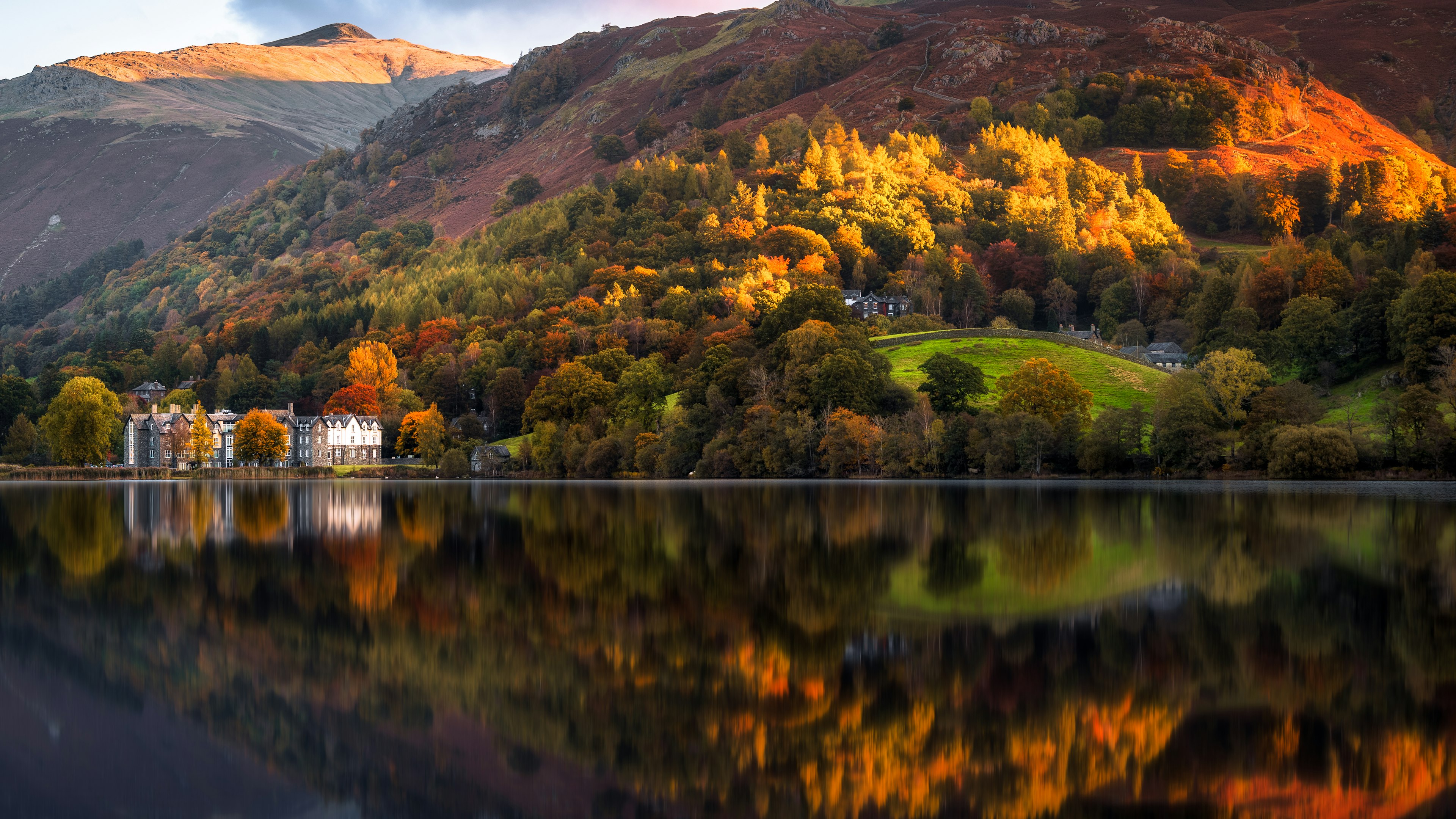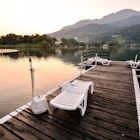
A first-time guide to England's Lake District


Get to know the beautiful Lake District with this guide to England's favorite national park. Joe Dunckley / Shutterstock
The 885-sq-mile Lake District is a hauntingly beautiful part of northwest England that is considered to be not only the most-visited national park, but also the nation's favorite. The region seduced Wordsworth and other literary giants, and continues to attract sightseers, walkers and adventurers in search of its fascinating heritage and abundant outdoor activities.
Until the mid-19th century the area was barely visited by outsiders – Daniel Defoe described it as "barren and frightful" in 1724 – but the Romantic poets’ idea of "sublime nature" encouraged an appreciation of wild places, and the introduction of the railway to Windermere in 1847 made mass tourism possible.
From Windermere to Scafell Pike, and the best things to do with your family, this first-time guide will tell you everything you need to know before visiting the Lake District.

Why visit the Lake District?
The landscape in the region is spellbinding: shadowy ridges gilded with golden light, shimmering meadows ablaze with wildflowers, and sparkling blue lakes that reflect the whole glorious scene.
Lakes are plentiful, of course: to the west of Windermere is Coniston Water and west of there are Wasdale valley and Wastwater, the deepest lake in England. North of Wastwater you’ll find Lake Buttermere, absurdly scenic from all angles, and east of Buttermere is Derwentwater, with its lovely wooded islands. Further east, Ullswater is arguably the most majestic of all, and is where the daffodils that inspired Wordsworth can be found.
Where in the Lake District should I go?
Here are some of the region's key locations and what you can do there.
Windermere
Bowness-on-Windermere is still the entry point for most visitors. Its adjacent namesake lake ribbons for 11 glorious miles through the gently undulating southern portion of the park. Taking a cruise here is a classic Lakeland experience, albeit one you’ll share with plenty of fellow sightseers.
Hawkshead
On the western side of Windermere is the village of Hawkshead, a pretty and atmospheric place to stay. It also has important connections to Beatrix Potter. You can visit Potter’s old home, a 17th-century cottage called Hill Top whose setting inspired much of her work.
Grasmere
Wordsworth was schooled in Hawkshead and lived for a time in Grasmere to the north of Windermere. You can visit his old home, Dove Cottage, where he penned some of the greatest poetry ever written – much of it concerned with the nature he found around him – and see his grave in St Oswald’s Churchyard.
Beyond here, heading further north into the middle of the park, the scenery becomes more wild and dramatic. Bottle-green valleys dotted with sheep and flanked by craggy ridges form great fissures in the landscape. Mountain passes, draped like bootlaces across the unforgiving terrain, link remote hamlets and villages.
Keswick
The most northerly of the Lake District's major towns, Keswick has the most beautiful location of all: encircled by cloud-capped fells and nestled alongside the idyllic, island-studded lake of Derwentwater, a silvery curve criss-crossed by puttering cruise boats. It's also brilliantly positioned for further adventures into the nearby valleys of Borrowdale and Buttermere, and is a great base for walking.

What are the best things to do in the Lake District?
Follow one of England's best hiking trails
The Lake District has some of the finest walking trails in the world. Walk Lakes is a useful resource and allows you to choose trails by both difficulty and location. Some popular routes include:
The 5-mile (8km) circuit around Buttermere is surrounded on all sides with mountains and offers consistently stunning views.
The popular 3-mile (5km) scramble up the 1476ft (450m) peak of Catbells, adjacent to Derwentwater, is slightly more testing and provides one of the best panoramic views in the Lake District.
For the glory of saying you’ve climbed the highest peak in the country, Scafell Pike beckons. This is doable for anyone with reasonable fitness but should be approached with common sense and waterproofs, not flip flops and a vest. If the weather is kind, you’ll catch a glimpse of Wastwater from the top – a mere puddle on the landscape when viewed from the 3208ft (978m) summit.
The national park also has a wide range of accessible walks for those who are less mobile. There are 50 routes, right across the national park to suit people of all abilities, including many routes for wheelchair users. You can find full details of those at the park website.
Hit the water, bike or climb
Not surprisingly, there’s an abundance of other ways to enjoy the outdoors in Lakeland, from water-based activities such as fishing and kayaking, to mountain-biking, climbing and gorge walking (often called "ghyll scrambling" in these parts). One of the most exciting adventure activities can be found at the Honister Slate Mine on its vertiginous via ferratas – think cables, cliffs and clinging on for dear life.
What is there to do with kids?
There are plenty of great family days out to be had in the Lakes, and they're not all reliant on favorable weather. For indoor entertainment, try the World of Beatrix Potter in Bowness. It's divided into areas themed on Potter's more famous stories and is perfect for younger children.
The Ravenglass and Eskdale Steam Railway (known locally as La'al Ratty) makes for a highly pleasant 40 minutes, trundling 7 miles (11km) from the coast through the lovely Eskdale valley to the foot of the Scafell range. Nearby Muncaster Castle, with its impressive castle grounds, has a Hawk and Owl Center with daily flying displays of birds of prey.
Is it easy to get to and around the Lake District?
It's possible to access and explore most of the Lake District using public transport – there are railway stations at Windermere, Oxenholme (Kendal) and Penrith, and an excellent network of local busses, including the legendary 555 that runs the entire length of the national park and is a day out in itself.
For convenience and flexibility, most prefer to use their own transport. The M6 flanks the entire eastern edge of the park, while the A591 and A66 dissect it internally. Most of the Lake District’s roads are rural and mountain passes may be closed in bad weather.
The national park also offers electric car hire options, as well as a network of charging points.

Where is the best place to stay?
The bulk of accommodations is in the four main towns – Bowness, Windermere, Ambleside and Keswick – but almost every village has at least one B&B option. There are also plenty of campsites and youth hostels.
What is the food like?
The county is crammed with passionate food producers and local delicacies. Taste Cumbria has a running schedule for local food markets. There are plenty of excellent pubs to choose from too, from no-nonsense fodder for hikers to fine-dining at the three-Michelin Starred L’Enclume in Cartmel.
What should I pack?
Be properly prepared for the likes of Helvellyn and Scafell Pike, especially in the colder months. You should have a pair of sturdy boots and waterproofs as an absolute minimum. There are many outdoor shops in the area where you can buy extra equipment or layers.
Explore related stories





 ActivitiesPlanning an England trip in 2024? Consider these 16 top places to visit
ActivitiesPlanning an England trip in 2024? Consider these 16 top places to visitFeb 26, 2024 • 10 min read



 Destination Practicalities16 local tips to know before traveling to England
Destination Practicalities16 local tips to know before traveling to EnglandJul 13, 2023 • 6 min read
